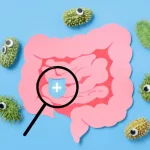If you’re confused about probiotics and prebiotics and want to know more, the infographic below, Probiotics and Prebiotics — How They Affect Your Health, is just what you’re looking for.
Both of these nutrients are important for your overall health, although they differ greatly in contribution.
Consuming both probiotics and prebiotics is important. Both nutrients have a positive effect on the human body, influencing the digestive, nervous, cardiovascular, and immune systems — as well as promoting healthy skin, prevention of tooth decay, and other conditions widely experienced across all demographics.
So, what is the difference between probiotics and prebiotics?
Probiotics are microorganisms that enter the digestive tract and are often referred to as “good bacteria”. They suppress the actions of harmful bacteria and substances in the gastrointestinal tract.
Our gastrointestinal tracts contain trillions of living organisms, all of which impact our overall health. The healthier the mix of organisms in the gut, the healthier we are.
This is why consuming probiotics, ideally through the food we eat, but also through supplements, holistically supports bodily health.
Prebiotics are nutrients that promote the growth of probiotic microbes and increase their activity, reinforcing the importance of consuming both nutrients.
Many prebiotics is also known as nondigestible fiber, which health professionals have urged us to add to our diet for years.
Fiber has other nutritional benefits beyond its influence on probiotics, but the connection between fiber and probiotics is one of which many people are unaware of.
Prebiotics are readily available in grocery stores, found in everything from apples to wheat bran.
Probiotics are somewhat more challenging, found primarily in foods that have yet to become popular in U.S. markets, such as kimchi and kefir.
Furthermore, probiotic foods are generally fermented, which gives them a flavor and overall eating experience that can be a bit of an initial shock to the system.
And, to complicate matters further, not all fermented foods contain probiotics, so it’s important to read product labels carefully and do your homework.
Nevertheless, adding generous portions of probiotic foods to your diet is a change well worth making.
For more information, please continue reading below.

![[Infographic] Fostering Emotional Intelligence in Children Through Parental Self-Understanding Emotional Intelligence in Children](https://www.safeandhealthylife.com/wp-content/uploads/2023/10/Emotional-Intelligence-in-Children-150x150.webp)


